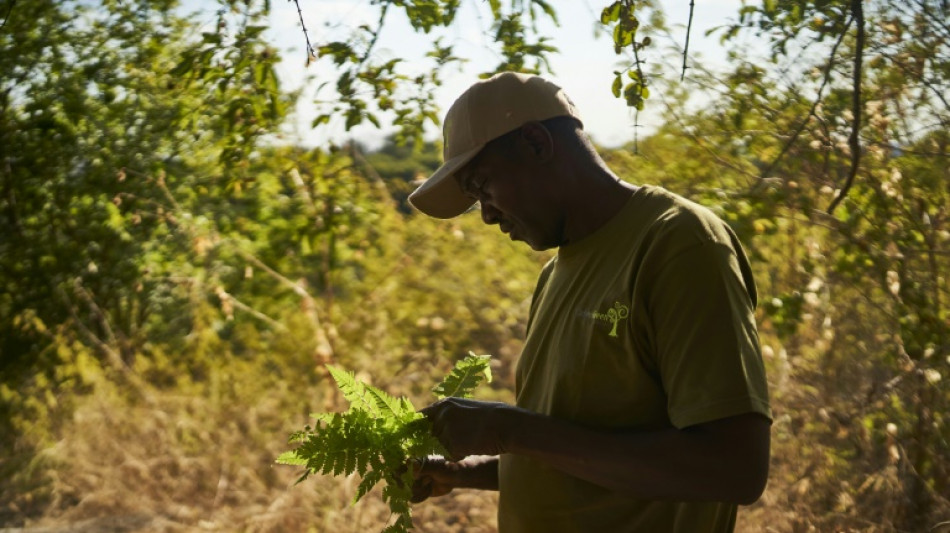
-
 Russia resumes attacks on Ukraine after Easter truce
Russia resumes attacks on Ukraine after Easter truce
-
Pope Francis has died aged 88

-
 Gaza civil defence describes medic killings as 'summary executions'
Gaza civil defence describes medic killings as 'summary executions'
-
Francis: radical leader who broke the papal mould
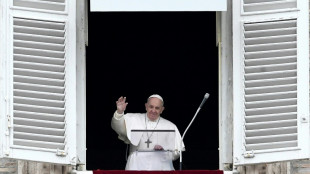
-
 Oscar stars, Max keeps mum, Sainz alive - Saudi GP talking points
Oscar stars, Max keeps mum, Sainz alive - Saudi GP talking points
-
Iyer, Kishan win back India contracts as Pant's deal upgraded

-
 Vance lands in India for tough talks on trade
Vance lands in India for tough talks on trade
-
Inside South Africa's wildlife CSI school helping to catch poachers

-
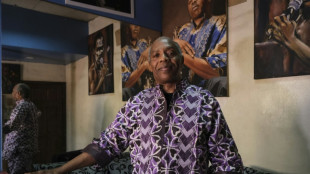 Nigerian Afrobeat legend Femi Kuti takes a look inward
Nigerian Afrobeat legend Femi Kuti takes a look inward
-
Kim Kardashian: From sex tape to Oval Office via TV and Instagram

-
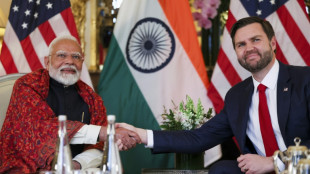 Vance in India for tough talks on trade
Vance in India for tough talks on trade
-
Thunder crush Grizzlies as Celtics, Cavs and Warriors win

-
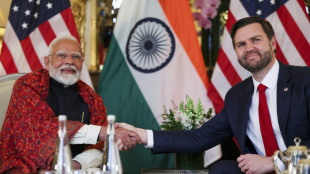 Vance heads to India for tough talks on trade
Vance heads to India for tough talks on trade
-
China slams 'appeasement' of US as nations rush to secure trade deals

-
 'Grandpa robbers' go on trial for Kardashian heist in Paris
'Grandpa robbers' go on trial for Kardashian heist in Paris
-
Swede Lindblad gets first win in just third LPGA start

-
 Gold hits record, dollar drops as tariff fears dampen sentiment
Gold hits record, dollar drops as tariff fears dampen sentiment
-
As Dalai Lama approaches 90, Tibetans weigh future

-
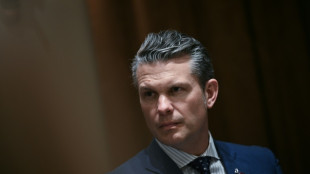 US defense chief shared sensitive information in second Signal chat: US media
US defense chief shared sensitive information in second Signal chat: US media
-
Swede Lingblad gets first win in just third LPGA start

-
 South Korea ex-president back in court for criminal trial
South Korea ex-president back in court for criminal trial
-
Thunder crush Grizzlies, Celtics and Cavs open NBA playoffs with wins

-
 Beijing slams 'appeasement' of US in trade deals that hurt China
Beijing slams 'appeasement' of US in trade deals that hurt China
-
Trump in his own words: 100 days of quotes
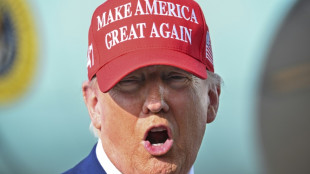
-
 Padres say slugger Arraez 'stable' after scary collision
Padres say slugger Arraez 'stable' after scary collision
-
Trump tariffs stunt US toy imports as sellers play for time

-
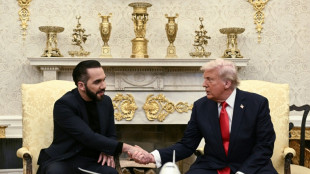 El Salvador offers to swap US deportees with Venezuela
El Salvador offers to swap US deportees with Venezuela
-
Higgo holds on for win after Dahmen's late collapse

-
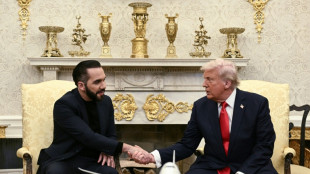 El Salvador's president proposes prisoner exchange with Venezuela
El Salvador's president proposes prisoner exchange with Venezuela
-
Gilgeous-Alexander, Jokic, Antetokounmpo named NBA MVP finalists

-
 Thomas ends long wait with playoff win over Novak
Thomas ends long wait with playoff win over Novak
-
Thunder rumble to record win over Grizzlies, Celtics top Magic in NBA playoff openers

-
 Linesman hit by projectile as Saint-Etienne edge toward safety
Linesman hit by projectile as Saint-Etienne edge toward safety
-
Mallia guides Toulouse to Top 14 win over Stade Francais

-
 Israel cancels visas for French lawmakers
Israel cancels visas for French lawmakers
-
Russia and Ukraine trade blame over Easter truce, as Trump predicts 'deal'

-
 Valverde stunner saves Real Madrid title hopes against Bilbao
Valverde stunner saves Real Madrid title hopes against Bilbao
-
Ligue 1 derby interrupted after assistant referee hit by projectile

-
 Leclerc bags Ferrari first podium of the year
Leclerc bags Ferrari first podium of the year
-
Afro-Brazilian carnival celebrates cultural kinship in Lagos

-
 Ligue 1 derby halted after assistant referee hit by projectile
Ligue 1 derby halted after assistant referee hit by projectile
-
Thunder rumble with record win over Memphis in playoff opener

-
 Leverkusen held at Pauli to put Bayern on cusp of title
Leverkusen held at Pauli to put Bayern on cusp of title
-
Israel says Gaza medics' killing a 'mistake,' to dismiss commander

-
 Piastri power rules in Saudi as Max pays the penalty
Piastri power rules in Saudi as Max pays the penalty
-
Leaders Inter level with Napoli after falling to late Orsolini stunner at Bologna

-
 David rediscovers teeth as Chevalier loses some in nervy Lille win
David rediscovers teeth as Chevalier loses some in nervy Lille win
-
Piastri wins Saudi Arabian Grand Prix, Verstappen second

-
 Kohli, Rohit star as Bengaluru and Mumbai win in IPL
Kohli, Rohit star as Bengaluru and Mumbai win in IPL
-
Guirassy helps Dortmund past Gladbach, putting top-four in sight


Zimbabwe's carbon credit takeover spooks locals, investors
It is shortly after sunrise, and Peter Mudenda looks for elephant tracks on a dirt road surrounded by mopane trees.
Once a farmer, the 49-year-old gave up the plough several years ago when a massive forest protection project was launched in Binga, a remote semi-arid district in northern Zimbabwe.
He now makes a living digging fireguards, taking care of trees and keeping tabs on wildlife.
"I was getting a good yield... but I was quick to appreciate that we could benefit more as a community from a conservancy," Mudenda told AFP.
The conservancy is part of a wider project that makes money selling carbon credits, a financial tool aimed at tackling climate change.
But in Zimbabwe, the model has been upended by a shock announcement that the government intends to claim half of all revenues.
As more countries look to regulate the sector, the move has created uncertainty in a $2 billion global market, stoking fears that other governments may follow suit, analysts say.
"The approach they've taken is quite radical and a bit blunt," said Gilles Dufrasne of Carbon Market Watch, an advocacy group.
The scheme in Binga is part of Kariba REDD+, the largest carbon credit initiative of its kind.
Carbon credits aim at providing an important funding source for conservation.
Companies or individuals buy credits from entities that remove or reduce greenhouse gas emissions, such as investing in renewable energy, planting trees or nurturing old forests.
Each credit is worth the equivalent of one tonne of carbon dioxide -- a useful badge of honour for those keen on proving their green credentials.
A partnership between Zimbabwean firm Carbon Green Investments and South Pole, a Swiss-based carbon offsets developer, Kariba REDD+ was launched 2011.
It now covers 785,000 hectares (1.9 million acres) of forest, fostering a series of community-led activities from beekeeping to ecotourism.
Since its inception it has generated more than 100 million euros ($110 million) from the sale of carbon credits, according to South Pole -- a figure that is expected to mushroom.
- Carbon credit boom -
The global market is forecast to grow at least five-fold to $10 billion by 2030, according to a 2023 estimate by oil giant Shell and the Boston Consulting Group (BCG).
Much of the trade happens between companies in a so-called voluntary market.
But countries are also negotiating an international carbon offset trading system to reach their climate targets under the umbrella of United Nations-led climate talks.
South Pole says most of Kariba's income was produced over the past two years. Gucci and Nestle are among firms that have bought into it.
Last month, Zimbabwe, which is cash strapped and in desperate need of foreign currency, said it wants a slice of the pie.
Francis Vorhies, a conservation economist at South Africa's Stellenbosch University, said there was a logic behind Zimbabwe's move, given that the national market was based largely on government-controlled resources.
But the new policy has spooked investors and locals alike.
"This is business, not charity work. There are investors putting in their money," said Elmon Mudenda, a local councillor in Binga, who shares the same surname as the former farmer but is not related to him.
"Government must be careful to come up with friendly policies, so that we don't have communities going back to a mindset where they don't value the conservation of forests."
Under the new policy, 50 percent of all revenue from carbon offset projects should go to the national treasury.
- 'Devil in the details' -
At least another 20 percent should go to local investors, while and foreign partners would be allowed to pocket no more than 30 percent.
All carbon credit deals are to be subjected to central approval and all agreements previously entered would be declared "null and void", Harare declared last month.
"(It) does raise the question of what they're going to do with the money," said Dufrasne of Carbon Market Watch.
South Pole says it initially took a 25 percent commission on Kariba sales, before it started to buy the credits for itself at a time of low prices to later resell them.
About 20 percent of revenue currently goes to fund environmental protection activities, with the rest split between local councils, communities and leaseholders, according to the firm's website.
Stephen Wentzel, director of Carbon Green Investments, said Kariba would remain viable if the government was to put its cut back into the project.
But due to Zimbabwe's "historical reputation," foreign firms might shy away from buying credits directly, and harbour suspicions about how the funds will be used, he said.
"The devil is in the details," said South Pole's spokeswoman Nadia Kahkonen, explaining no concrete regulation has yet followed the announcement.
"Speculation and political discourse currently creates even more uncertainty... and will slow down if not halt investments in local projects."
L.Janezki--BTB




